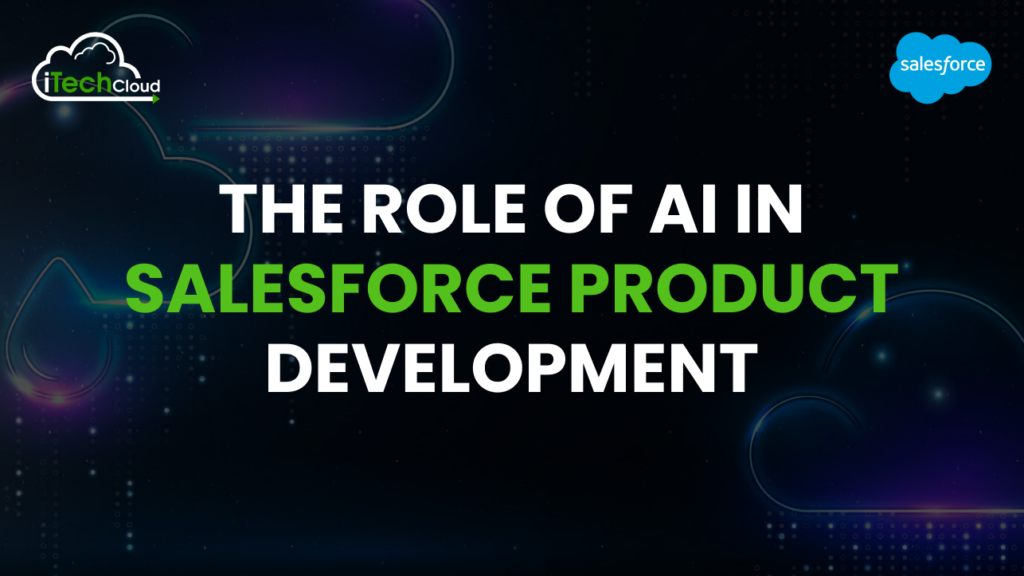The Role of AI in Salesforce Product Development

The integration of Artificial Intelligence (AI) into product development processes has revolutionized industries worldwide, and Salesforce is no exception. As a leading customer relationship management (CRM) platform, Salesforce leverages AI to enhance its offerings, improve customer experiences, and empower businesses to achieve greater efficiency. Here, we explore the multifaceted role of AI in Salesforce product development, highlighting its significance, applications, and future potential.
Table of Contents
The Growing Importance of AI in CRM
AI role in CRM has evolved rapidly, with businesses recognizing its potential to transform customer interactions. Salesforce, through its AI-powered innovations, enables organizations to:
- Personalize the customer experience by analyzing large amounts of data.
- Automate repetitive tasks to free up your employees to focus on strategic initiatives.
- Generate actionable insights to make data-driven decisions.
Einstein AI: Salesforce Flagship AI Technology
Central to Salesforce AI capabilities is Einstein AI, a comprehensive suite of AI technologies integrated into the Salesforce platform. Einstein enhances Salesforce’s core products, such as Sales Cloud, Service Cloud, Marketing Cloud, and Commerce Cloud, by delivering predictive and prescriptive analytics.
1. Sales Cloud:
Einstein boosts sales productivity by predicting customer behavior, scoring leads, and recommending the next best actions. AI-powered forecasting provides sales teams with accurate projections, helping them prioritize efforts and close deals efficiently.
2. Service Cloud:
Einstein automates case classification and routing, ensuring that issues are resolved promptly. AI-driven chatbots handle routine queries, reducing the workload on support teams while maintaining customer satisfaction.
3. Marketing Cloud:
Einstein identifies trends and preferences, enabling marketers to create personalized campaigns. Predictive analytics helps optimize email delivery times, content recommendations, and audience segmentation.
4. Commerce Cloud:
AI-powered product recommendations and dynamic pricing enhance the shopping experience. Einstein’s capabilities ensure businesses stay competitive by adapting to customer behavior in real time.
Key AI Capabilities in Salesforce Product Development
Salesforce leverages a wide range of AI technologies to develop innovative features:
1. Natural Language Processing (NLP):
NLP enables Salesforce products to understand and process human language. For example, Einstein’s NLP capabilities power chatbots, sentiment analysis, and language translation features, enhancing communication between businesses and customers.
2. Machine Learning (ML):
Machine learning algorithms analyze historical data to identify patterns and predict future outcomes. Salesforce utilizes ML for lead scoring, churn prediction, and customer lifetime value estimation.
3. Computer Vision:
AI-driven image recognition tools, such as Einstein Vision, allow businesses to analyze images for insights. This technology is particularly useful in industries like retail and healthcare.
4. Predictive Analytics:
Predictive analytics empowers businesses to make proactive decisions. From sales forecasts to inventory management, these insights drive operational efficiency.
5. Robotic Process Automation (RPA):
Salesforce incorporates RPA to automate repetitive processes, such as data entry and workflow management. This reduces manual effort and improves accuracy.
Enhancing Developer Efficiency with AI
AI not only benefits end-users but also transforms the way Salesforce developers work. Key ways AI supports developers include:
1. Code Generation and Debugging:
AI tools like Salesforce Code Builder leverage NLP to assist developers in writing and debugging code faster. By providing real-time suggestions and error detection, these tools improve productivity.
2. Automated Testing:
AI-driven testing frameworks ensure the reliability of Salesforce applications. Automated test scripts reduce the time spent on quality assurance, enabling faster deployment cycles.
3. Custom Predictions:
Developers can build custom AI models using Einstein Prediction Builder without requiring extensive coding knowledge. This democratizes AI, allowing non-technical users to harness its power.
4. Data Integration and Processing:
AI-powered data integration tools streamline the process of connecting disparate data sources. Salesforce MuleSoft platform enhances this capability, ensuring seamless data flow.
AI-Driven Customer Insights
Salesforce AI solutions empower businesses to gain a deeper understanding of their customers. Key features include:
1. Customer 360:
By integrating data from various touchpoints, Salesforce provides a holistic view of customers. AI analyzes this data to deliver personalized experiences and predict customer needs.
2. Sentiment Analysis:
NLP-driven sentiment analysis tools assess customer feedback, enabling businesses to address concerns proactively and improve satisfaction.
3. Behavioral Analytics:
AI identifies patterns in customer behavior, such as purchasing habits or service interactions. This insight informs strategies to enhance engagement and retention.
Ethical Considerations in AI Development
As Salesforce integrates AI into its products, ethical considerations remain a top priority. Salesforce ensures that its AI technologies are:
1. Transparent:
Users are informed about how AI-driven decisions are made, fostering trust and accountability.
2. Inclusive:
AI models are designed to minimize bias and promote fairness, ensuring equitable outcomes for diverse user groups.
3. Secure:
Data privacy and security are integral to Salesforce AI solutions, aligning with global compliance standards such as GDPR and CCPA.
The Future of AI in Salesforce
Salesforce continues to invest in AI research and development. Emerging trends include:
1. Generative AI:
Salesforce aims to enhance content creation, from marketing materials to knowledge base articles.
2. Real-Time Decision-Making:
AI-powered real-time analytics will enable businesses to respond to customer needs instantly, improving agility and competitiveness.
3. Industry-Specific Solutions:
Salesforce is likely to expand its AI capabilities to cater to niche industries, such as healthcare, manufacturing, and financial services.
4. Augmented Intelligence:
Salesforce seeks to create a symbiotic relationship that maximizes efficiency and innovation.
Conclusion
The role of AI in Salesforce product development is transformative, driving innovation across CRM solutions. From improving customer experiences to enhancing developer efficiency, AI empowers businesses to thrive in an increasingly competitive landscape. As Salesforce continues to push the boundaries of AI, its commitment to ethical practices ensures that these advancements benefit all stakeholders. The future of CRM is undoubtedly AI-driven, and Salesforce stands at the forefront of this evolution, enabling organizations to achieve unprecedented success.

